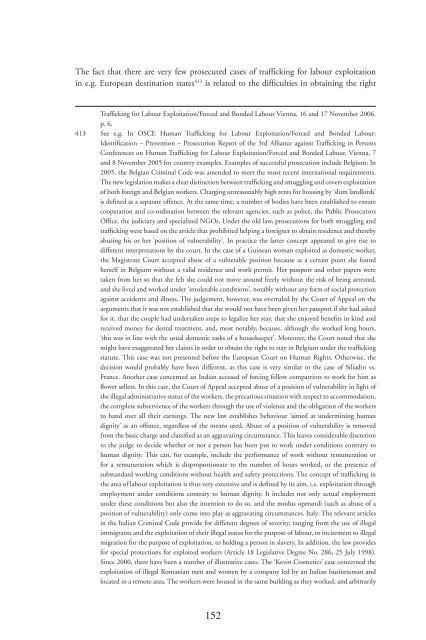Trafficking in human beings: human rights and ... - unesdoc - Unesco
Trafficking in human beings: human rights and ... - unesdoc - Unesco
Trafficking in human beings: human rights and ... - unesdoc - Unesco
You also want an ePaper? Increase the reach of your titles
YUMPU automatically turns print PDFs into web optimized ePapers that Google loves.
The fact that there are very few prosecuted cases of traffi ck<strong>in</strong>g for labour exploitation<br />
<strong>in</strong> e.g. European dest<strong>in</strong>ation states 413 is related to the diffi culties <strong>in</strong> obta<strong>in</strong><strong>in</strong>g the right<br />
Traffi ck<strong>in</strong>g for Labour Exploitation/Forced <strong>and</strong> Bonded Labour Vienna, 16 <strong>and</strong> 17 November 2006.<br />
p. 6.<br />
413 See e.g. In OSCE Human Traffi ck<strong>in</strong>g for Labour Exploitation/Forced <strong>and</strong> Bonded Labour:<br />
Identifi cation – Prevention – Prosecution Report of the 3rd Alliance aga<strong>in</strong>st Traffi ck<strong>in</strong>g <strong>in</strong> Persons<br />
Conferences on Human Traffi ck<strong>in</strong>g for Labour Exploitation/Forced <strong>and</strong> Bonded Labour. Vienna, 7<br />
<strong>and</strong> 8 November 2005 for country examples. Examples of successful prosecution <strong>in</strong>clude Belgium: In<br />
2005, the Belgian Crim<strong>in</strong>al Code was amended to meet the most recent <strong>in</strong>ternational requirements.<br />
The new legislation makes a clear dist<strong>in</strong>ction between traffi ck<strong>in</strong>g <strong>and</strong> smuggl<strong>in</strong>g <strong>and</strong> covers exploitation<br />
of both foreign <strong>and</strong> Belgian workers. Charg<strong>in</strong>g unreasonably high rents for hous<strong>in</strong>g by ‘slum l<strong>and</strong>lords’<br />
is defi ned as a separate offence. At the same time, a number of bodies have been established to ensure<br />
cooperation <strong>and</strong> co-ord<strong>in</strong>ation between the relevant agencies, such as police, the Public Prosecutors<br />
Offi ce, the judiciary <strong>and</strong> specialized NGOs. Under the old law, prosecutions for both smuggl<strong>in</strong>g <strong>and</strong><br />
traffi ck<strong>in</strong>g were based on the article that prohibited help<strong>in</strong>g a foreigner to obta<strong>in</strong> residence <strong>and</strong> thereby<br />
abus<strong>in</strong>g his or her ‘position of vulnerability’. In practice the latter concept appeared to give rise to<br />
different <strong>in</strong>terpretations by the court. In the case of a Gu<strong>in</strong>ean woman exploited as domestic worker,<br />
the Magistrate Court accepted abuse of a vulnerable position because at a certa<strong>in</strong> po<strong>in</strong>t she found<br />
herself <strong>in</strong> Belgium without a valid residence <strong>and</strong> work permit. Her passport <strong>and</strong> other papers were<br />
taken from her so that she felt she could not move around freely without the risk of be<strong>in</strong>g arrested,<br />
<strong>and</strong> she lived <strong>and</strong> worked under ‘<strong>in</strong>tolerable conditions’, notably without any form of social protection<br />
aga<strong>in</strong>st accidents <strong>and</strong> illness. The judgement, however, was overruled by the Court of Appeal on the<br />
arguments that it was not established that she would not have been given her passport if she had asked<br />
for it, that the couple had undertaken steps to legalize her stay, that she enjoyed benefi ts <strong>in</strong> k<strong>in</strong>d <strong>and</strong><br />
received money for dental treatment, <strong>and</strong>, most notably, because, although she worked long hours,<br />
‘this was <strong>in</strong> l<strong>in</strong>e with the usual domestic tasks of a housekeeper’. Moreover, the Court noted that she<br />
might have exaggerated her claims <strong>in</strong> order to obta<strong>in</strong> the right to stay <strong>in</strong> Belgium under the traffi ck<strong>in</strong>g<br />
statute. This case was not presented before the European Court on Human Rights. Otherwise, the<br />
decision would probably have been different, as this case is very similar to the case of Siliad<strong>in</strong> vs.<br />
France. Another case concerned an Indian accused of forc<strong>in</strong>g fellow compatriots to work for him as<br />
fl ower sellers. In this case, the Court of Appeal accepted abuse of a position of vulnerability <strong>in</strong> light of<br />
the illegal adm<strong>in</strong>istrative status of the workers, the precarious situation with respect to accommodation,<br />
the complete subservience of the workers through the use of violence <strong>and</strong> the obligation of the workers<br />
to h<strong>and</strong> over all their earn<strong>in</strong>gs. The new law establishes behaviour ‘aimed at underm<strong>in</strong><strong>in</strong>g <strong>human</strong><br />
dignity’ as an offence, regardless of the means used. Abuse of a position of vulnerability is removed<br />
from the basic charge <strong>and</strong> classifi ed as an aggravat<strong>in</strong>g circumstance. This leaves considerable discretion<br />
to the judge to decide whether or not a person has been put to work under conditions contrary to<br />
<strong>human</strong> dignity. This can, for example, <strong>in</strong>clude the performance of work without remuneration or<br />
for a remuneration which is disproportionate to the number of hours worked, or the presence of<br />
subst<strong>and</strong>ard work<strong>in</strong>g conditions without health <strong>and</strong> safety protections. The concept of traffi ck<strong>in</strong>g <strong>in</strong><br />
the area of labour exploitation is thus very extensive <strong>and</strong> is defi ned by its aim, i.e. exploitation through<br />
employment under conditions contrary to <strong>human</strong> dignity. It <strong>in</strong>cludes not only actual employment<br />
under these conditions but also the <strong>in</strong>tention to do so, <strong>and</strong> the modus oper<strong>and</strong>i (such as abuse of a<br />
position of vulnerability) only come <strong>in</strong>to play as aggravat<strong>in</strong>g circumstances. Italy: The relevant articles<br />
<strong>in</strong> the Italian Crim<strong>in</strong>al Code provide for different degrees of severity, rang<strong>in</strong>g from the use of illegal<br />
immigrants <strong>and</strong> the exploitation of their illegal status for the purpose of labour, to <strong>in</strong>citement to illegal<br />
migration for the purpose of exploitation, to hold<strong>in</strong>g a person <strong>in</strong> slavery. In addition, the law provides<br />
for special protections for exploited workers (Article 18 Legislative Degree No. 286, 25 July 1998).<br />
S<strong>in</strong>ce 2000, there have been a number of illustrative cases. The ‘Kev<strong>in</strong> Cosmetics’ case concerned the<br />
exploitation of illegal Romanian men <strong>and</strong> women by a company led by an Italian bus<strong>in</strong>essman <strong>and</strong><br />
located <strong>in</strong> a remote area. The workers were housed <strong>in</strong> the same build<strong>in</strong>g as they worked, <strong>and</strong> arbitrarily<br />
152

















